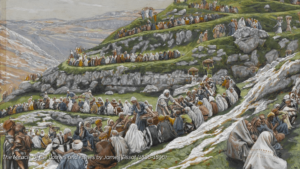“Bearing with one another through love,
striving to preserve the unity of the spirit through the bond of peace.”

In the first reading and the Gospel for this Sunday, we are reminded of the great- ness of the power of God and how He delights to use it for His People. Elisha’s faith in the midst of the insufficiency of the food supply facilitates this early bread miracle in the history of Israel. Like his predecessor Elijah, the multiplication of food was something that occurred through him.
The author of Second Kings simply shares the narration, somewhat wryly noting that “there was some left over, as the Lord had said.” A wonderful miracle occurs, and it almost seems like the Biblical author’s attitude was, “Why are you surprised, what did you expect?”
When we see the faith of men and women like Elijah and Elisha, we are given a choice: do we try to imitate their faith or do we just go our own way? The faith expressed in these kinds of miracles, especially bread miracles, was meant to gradually increase the faith of the People of God so that when the ultimate Bread miracle occurs at the Last Supper, their hearts and minds had been prepared for it. Miracles like this multiplication by Elisha, or the miracle that Elijah experienced eating a small loaf of bread and then, “on the strength of that food,” being able to walk 40 days and 40 nights to the place God was calling him, or the great miracle of the time in the desert, the manna, are all to increase the faith of the Chosen for what will be the greatest miracle of all: the Eucharistic Lord being present.
Jesus feeds over five thousand with an initial food supply that would barely have sustained the Apostles themselves. The People see this, recognize the miracle, and move to make Him king. But it is not yet the time for the manifestation of His kingship. The Apostles gradually realize that His kingship is of a different sort–this King lays down His life in service for His friends. He gives them a graphic example of that at the Last Supper itself, when He assumes the position common to the lowest slave and washes their feet. He then does the incredible: He gives Himself to them under the appearance of Bread and Wine and proclaims to them that this is His Body and His Blood. He also gives to them the power to bring about that miracle itself so that, for all time, His followers may have this Body and Blood without which, as He said, they could not have life.
This Eucharistic Presence, the heart of the Holy Sacrifice of the Mass, has been the center of what we believe as Catholics ever since. It is, as the Second Vatican Council taught, the source and summit of our Christian life. This Sacrifice of the Mass is celebrated in many different ways throughout the history of the Church, in different rites, different liturgies, etc. But it has been, for all who bear the name Catholic, the crucial center of who they are. How sad then that different ways of celebrating this infinite gift have become a source of contention, even division, among the People of God.
It is interesting that between the Scriptures speaking of the bread miracles, we are given in the second reading a strong admonition “to live in a manner worthy of the call we have received.” St. Paul specifies what that entails: “bearing with one another through love, striving to preserve the unity of the spirit through the bond of peace.” Love and unity in the spirit mark the way of life that is worthy of the great call that each of us has received.
Do we regard those as crucial criteria in deciding what we say, especially in terms of these liturgical issues? Are we strengthening the bond of unity or hindering it? Are we acting in love or against love? The King of Kings and Lord of Lords certainly does not intend the gift of His Sacred Body and Blood to be a wedge that drives apart His followers. Unity is not an automatic thing; we are reminded that we must strive for it, in Jesus. Then let us heed His call and respond to His grace that we may truly build “the bond of peace.” – Fr. Ed Fride
Read More from Fr. Ed Fride
Third Sunday of Easter, 2022
“I will praise You, Lord, for You have rescued me.” The great Octave of Easter concluded with Divine Mercy Sunday, one of Pope St. John Paul the Great’s many gifts to the Church. During these last few weeks we have been graphically reminded of the gifts to us of the Eucharistic Lord, of the ... Read more

